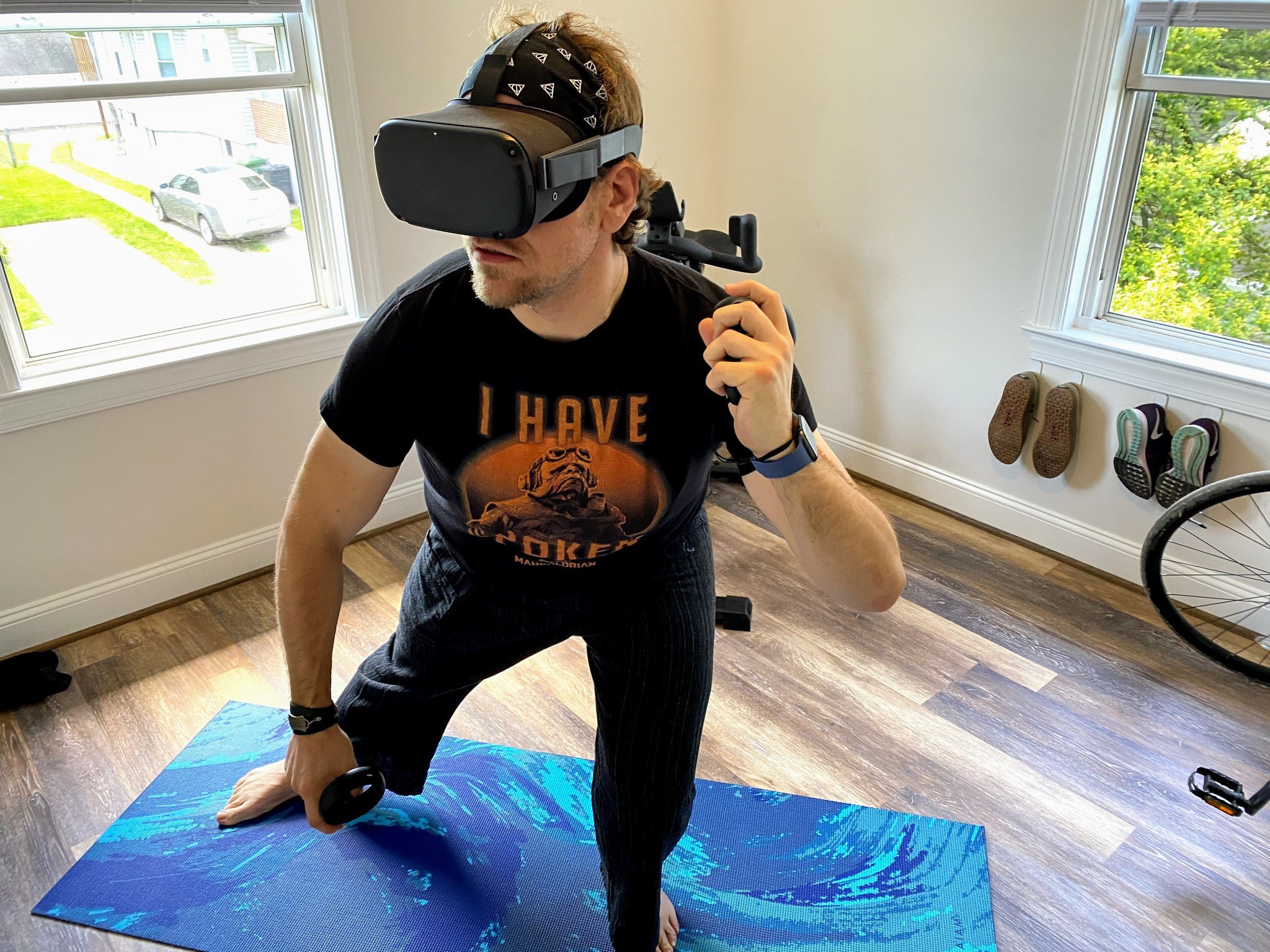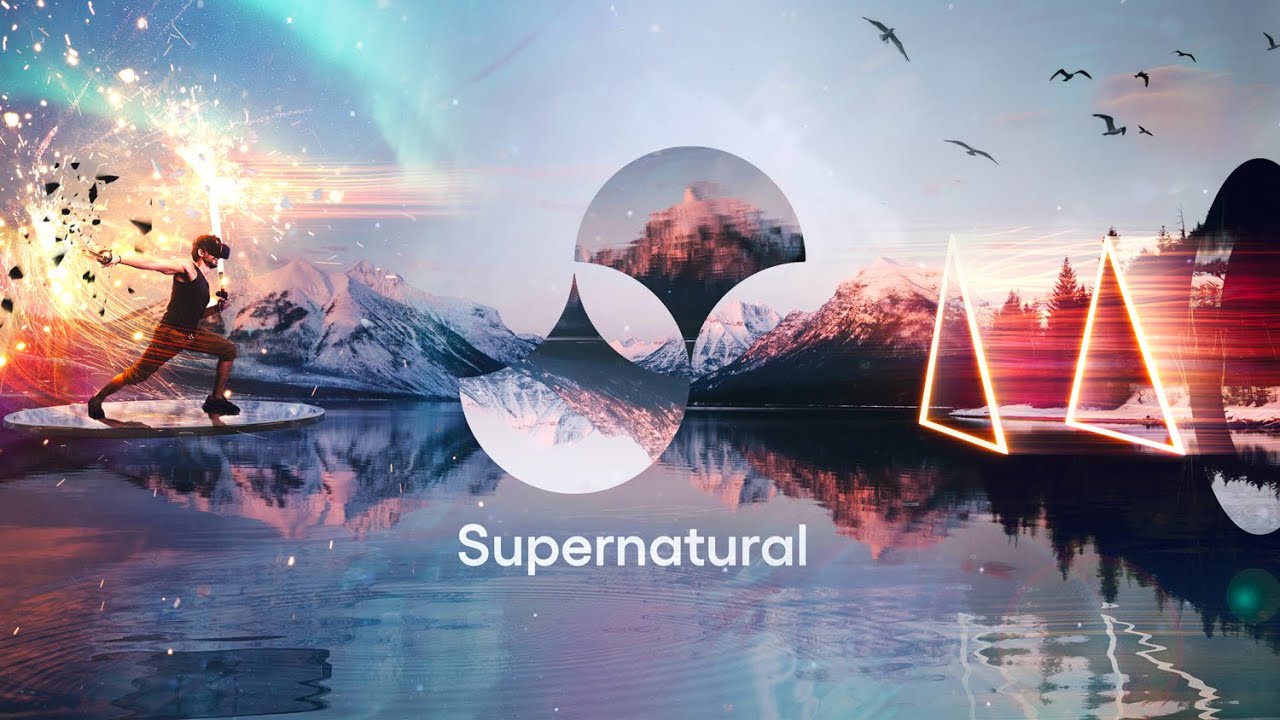The first time I worked out in VR, it happened by accident. I emerged from my first session of Beat Saber, wide-blinking and dripping with sweat, having just unboxed an Oculus Quest 2 an hour earlier, my only previous VR experience a few years earlier with the now-forgotten Google Daydream.
As editor of this website, I read a lot about VR — we cover the best Oculus Quest 2 games and accessories extensively — but I didn't expect to fall as hard, and as quickly, for it as I did. Perhaps it's the sheer novelty of tricking your brain into thinking you're not in the same house, the same room, you've been living and working in for the past 18 months. Perhaps it's the propulsive nature of the input itself — games don't merely respond to the trigger movements in my thumbs and fingers but my whole hand, my arms, my head. It's the fulsomeness of the experience that enamored me.
Unlike most workout notifications, I don't resent the ones I get about Supernatural. Yet.
So, after that first play Beat Saber play session, and the knowledge that I've been working out less than I'd like to over the past few months, I sought out Supernatural, the $20/month fitness app that takes aspects of Beat Saber and adds recognizable music (sans DLC), an emphasis on full-body movement with squats and lunges in a 360-degree space, and trainers that keep you motivated throughout each 25-or-so-minute session.
Despite understanding the criticisms leveled at Supernatural — that it's far too expensive, that it lacks gamification or multiplayer support, and that it doesn't really add anything to the existing rhythm game canon — I've quickly fallen for everything the service does right. Placing you in beautiful remote landscapes (though admittedly low-resolution) to hit targets barrelling towards you at varying speeds and angles to a playlist of popular songs, the disembodied voice of a trainer you see for a couple of minutes at the beginning and end of the workout motivating you as you go, I've begun looking forward to each session, even when my phone bugs me every morning to "meet [my] trainer in 15 minutes."
I'm less interested in evaluating Supernatural as a workout alone, for which I may lose interest over time as I would any other, and more about the intoxicating way VR helps me forget that I'm doing something I don't find particularly enjoyable in other forms. I've never been one satisfied with a treadmill or stationary bike, preferring to be out on the tennis or basketball court with friends.
But Supernatural's debut in the early months of the pandemic caused the same minor revolution within the VR world as Peloton did for spin addicts who could no longer attend in-person classes led by their favorite instructors. I remember seeing the accolades for both services stream through in mid-2020 wondering just how effective (and potentially uncomfortable) a VR workout could actually be.
Turns out it can be pretty potent. Supernatural workouts are divided into three tracks: low, medium, and high intensity, with options for each at varying lengths, though most have between two and five songs in their playlists. The bulk of the subscription costs go towards music licensing, since the songs you're bouncing away to are recognizable hits from nearly every popular artist and genre. (Supernatural mirrors each workout playlist on Spotify if you're interested in finding them again.)
One of my recent favorites, called Shower Songs, combined a cover of A Crowded House's famous one-hit-wonder, "Don't Dream It's Over," with Janelle Monae's "Make Me Feel," Robyn's "Call Your Girlfriend," The Weeknd's "Blinding Lights," and Tegan and Sara's "Closer." You pay for the access to the music, sure, but particularly the curation, the way the end result feels like more than the sum of its parts and, primarily, for the extra push towards the end of the final track, when you're particularly exhausted, from the instructor encouraging you to "find your moment" and "will yourself to push through it."
Like other workouts that combine cardio with mindfulness, with a particular emphasis on self-improvement and discovery, Supernatural is easy to criticize for its attempt to build a community around a culture, especially when the mechanics of the actual workout — using your Oculus Touch controllers to swipe at incoming targets to a music beat — can be easily reproduced in any number of other cheaper options on the platform. But after trying most of the competitors on the platform, nothing comes close to making me want to return, day after day, to unceremoniously drip sweat onto a mat in the middle of my office.
I don't know if I'm going to spend the $180 USD for an annual subscription to Supernatural once my free trial ends. I probably will because God knows I've spent more on dumber things over the past year, and even if I use it a couple times a week I'll feel somewhat validated in my decision. But more importantly, I've discovered VR as a truly wonderful vehicle for movement, the kind of unselfconscious, unfettered movement that used to be literally impossible before untethered VR just a couple of years ago. Yes, you need a big enough space to move around safely, but getting to know the Oculus ecosystem over the past few weeks has been, especially as someone coming from the known duality of consoles and phones, simply joyful. I like Facebook's encroachment on Oculus as little as the next person, but there are bounties here if you know where to look.


Tidak ada komentar:
Posting Komentar